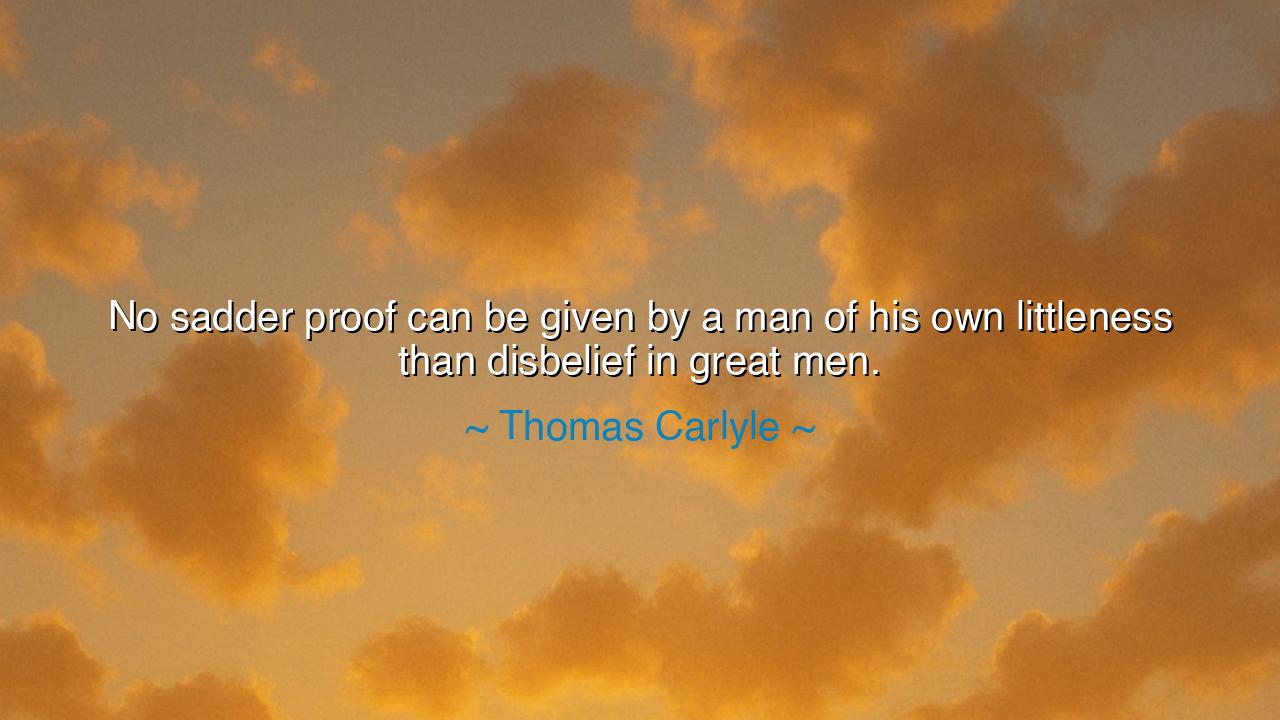
No sadder proof can be given by a man of his own littleness than
No sadder proof can be given by a man of his own littleness than disbelief in great men.






Hearken, O seekers of wisdom, to the piercing words of Thomas Carlyle, who declared: “No sadder proof can be given by a man of his own littleness than disbelief in great men.” In these words lies a meditation upon humility, vision, and the recognition of greatness. Carlyle teaches that to deny the existence of extraordinary individuals, or to diminish their achievements, is to betray one’s own limitations of imagination and courage. True understanding of history, society, and virtue begins with the acknowledgment that greatness is real, and that it shapes the world in profound ways.
From the earliest civilizations, philosophers understood the power of extraordinary men and women to influence destiny. In Athens, Pericles guided the polis through wisdom, strategy, and eloquence, and those who denied the weight of his influence revealed not insight but envy and shortsightedness. Carlyle’s reflection mirrors this enduring truth: to reject or disbelieve greatness is to remain small in spirit, blind to the heights human endeavor can reach. Recognition of greatness demands humility and openness, for it challenges our own preconceptions and limitations.
The words illuminate the moral dimension of acknowledgment. To deny the deeds or vision of the great is not merely intellectual error; it is a symptom of moral and spiritual confinement. History is replete with those who refused to see the courage of leaders, inventors, and thinkers, and in doing so, they constrained their own capacity to aspire and act. Consider Galileo Galilei, whose revelations about the heavens were met with disbelief and condemnation by many. Those who refused to see his genius revealed their own intellectual littleness, blinded by tradition and fear rather than enlightened by observation and reason.
Carlyle’s reflection also underscores the role of vision in human progress. The great men he speaks of are architects of culture, builders of civilization, and bearers of ideas that transcend their time. To recognize their greatness is to cultivate reverence for courage, creativity, and moral insight, and to allow their example to inspire personal growth. Those who disbelieve in greatness deny themselves the guidance of history and the illumination of the human spirit.
Consider the life of Abraham Lincoln, who rose from humble beginnings to lead a nation through its gravest crisis. Many contemporaries doubted his vision and capacity, yet those who recognized his greatness witnessed the profound impact of leadership forged in character, wisdom, and courage. Carlyle reminds us that disbelief in figures such as Lincoln is not mere skepticism; it is evidence of the smallness of one’s imagination and moral scope, a failure to perceive the extraordinary in the ordinary.
From this meditation emerges a timeless lesson: cultivate openness to greatness, both in history and in life. Recognize the achievements, courage, and vision of those who surpass ordinary measure. To see greatness is to expand one’s own mind, to aspire beyond narrow confines, and to participate in the ongoing legacy of human achievement. Disbelief in the exceptional reveals not reality, but limitation.
Practical counsel flows naturally: study the lives of remarkable individuals, learn from their deeds, and allow their vision to inspire personal and collective growth. Do not shrink before the example of greatness, but embrace it as a guide, a challenge, and a model for ethical and ambitious living. By acknowledging the extraordinary, one nurtures humility, imagination, and courage in one’s own soul.
Thus, O listener, let the words of Thomas Carlyle illuminate your path: to deny the existence of great men is to betray one’s own littleness, to confine the spirit, and to blind oneself to the heights of human potential. Open your mind to courage, wisdom, and vision, for recognition of greatness elevates both the soul and society, transforming doubt into reverence, and limitation into aspiration.






AAdministratorAdministrator
Welcome, honored guests. Please leave a comment, we will respond soon